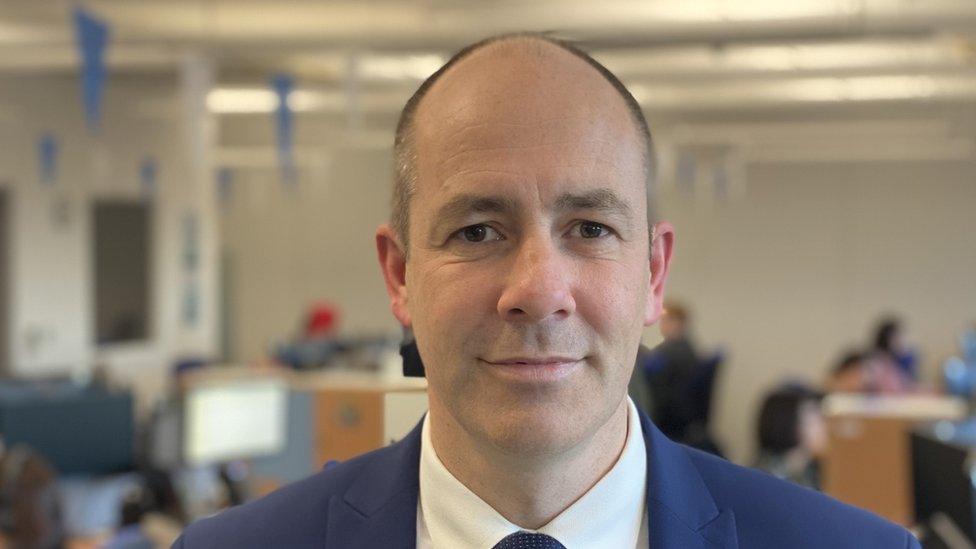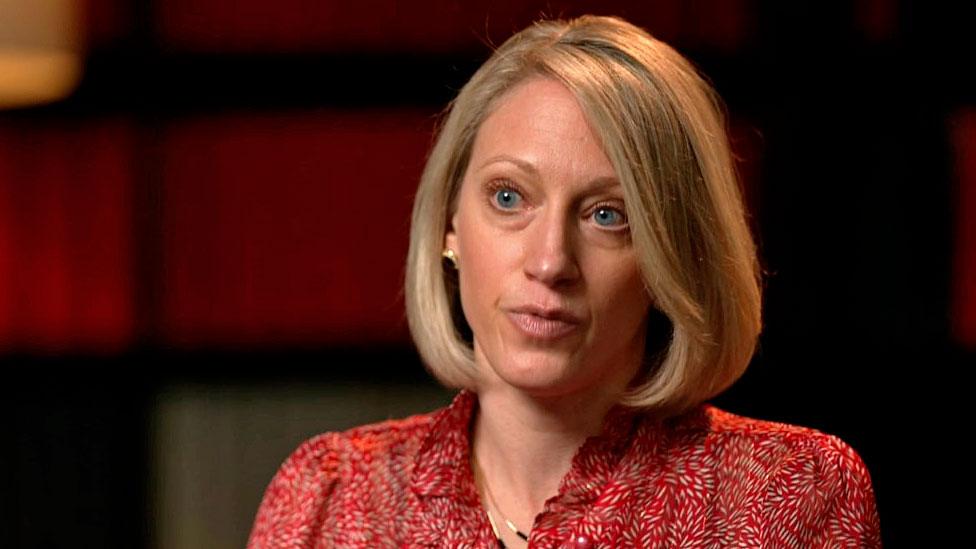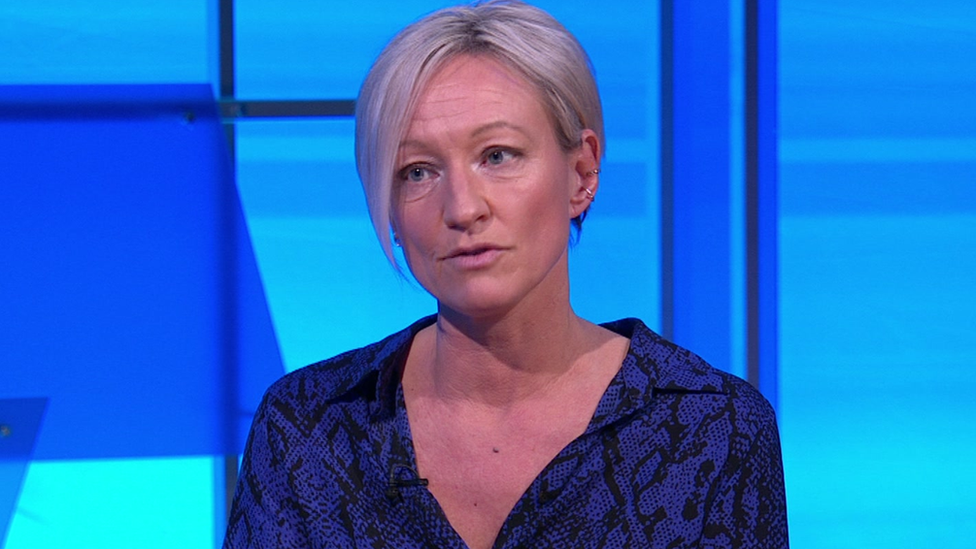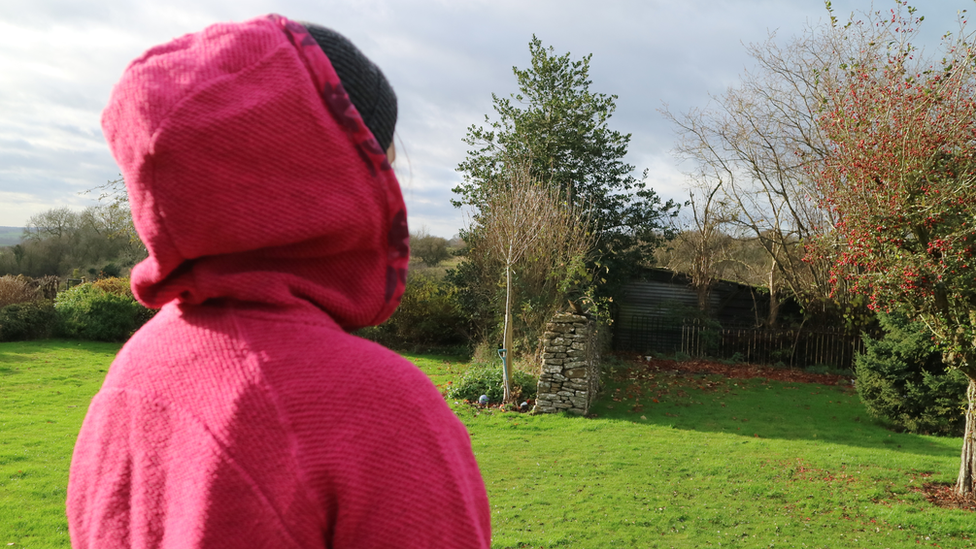Stalking: Victims say new ways needed to tackle crime
- Published
Chloe Hopkins, who was stalked and harassed for seven years, says police did not take the behaviour seriously enough
Police need to find new ways of tackling stalking, a decade after it was made a specific offence, victims have said.
Chloe Hopkins, from Prestatyn, Denbighshire, was stalked for seven years and said it was not "taken as seriously as it should be".
Ms Hopkins said it was great there were laws, but there was a long way to go.
Police forces in Wales said they were investing in training and resources to tackle stalking.
Ms Hopkins was stalked between the ages of 18 and 25 after being crowned Miss Prestatyn in 2010, which she said turned her from feeling "on top of the world", to "unwell, insecure and upset".
She supports new methods of tackling the crime.
"You can never do enough research or investigations when it comes to this type of thing, because for stalkers, it's a full time job."

The abuse began when Miss Hopkins was crowned Miss Prestatyn in 2010
The Home Office said it took stalking "extremely seriously" while the National Police Chief's Council (NPCC) said it recognised more needed to be done to improve outcomes for victims.
Prof Jane Monckton Smith, a criminologist at the University of Gloucestershire, has been working with police to use new ways of measuring risk.
"We need to look at how obsessed these people are - all stalkers are obsessed - so we need to look at the time they invest on a daily basis to their stalking campaign," she said.
'Stalking is his full-time job'
Prof Smith's work looks at how much time a perpetrator spends stalking a victim and how much danger a victim could be in.

Chloe Hopkins was stalked, harassed and bombarded with abusive messages online, her obsessed pursuer drove her to depression and bulimia
It is currently in a research stage, but police forces are already piloting it ahead of it being published.
Prof Smith used the example of Alice Ruggles, who was killed by her stalker, Trimaan Dhillon.
Dhillon travelled from Edinburgh to Gateshead to leave flowers on Alice's doorstep.
"What we see at the moment is the bunch of flowers, and think 'well that's not good'.
"But what we don't think is that he took a whole day off work just to leave those flowers, so we've probably got eight hours of stalking in that day, the stalking is his full-time job."

Prof Jane Monckton Smith's research could help police prove to probation services and courts the need for intervention
Data analysed by the BBC's Shared Data Unit showed charge rates have more than halved in Wales over the past four years - from 16% in 2018-19 to 7% in 2021-22.
In the same period the conviction rate is 74%.
Police data for Wales' four forces shows reports of stalking has tripled over the past four years, with more than 6,000 stalking offences recorded in 2021-22.
The Home Office pointed to the fact changes in the way stalking was recorded by police forces in April 2020.
Prof Smith added that, if the amount of time someone invested in stalking was considered, it can be a lightbulb going on, and could make people think, "actually this person is quite dangerous".
She said this type of evidence could help police prove to probation services and courts the need for intervention, and gaining things like stalking protection orders, external.

Det Ch Insp Richard Yelland of Dyfed-Powys Police said the research was providing them with practical and tactical investigative advice
Dyfed-Powys Police has championed the use of this research and said work like Prof Smith's has been "revolutionary".
Both Gwent Police and South Wales Police said they had worked with Prof Smith to bring her training into their forces. North Wales Police does not have plans to introduce this work.
Det Ch Insp Richard Yelland of Dyfed-Powys Police said: "It is important that we continue to change and adapt the way in which we investigate and manage these type of crimes.
"The research has shown us that coercive control and behaviour is a bigger indicator, and predictor, of murder than it is violence.
"We know when we're going about our investigations, we're maximising the evidence collection process, whilst also making sure the victim is safe to continue their lives."
He said this had resulted in an increase in the number of stalking offences and stalking protection orders issued.
His force said it was also carrying out work in perpetrator programmes in order to challenge and seek long-term behavioural change as well as introducing stalking clinics which allow staff to raise issues about cases that may involve the crime.

Ms Bourne said they use the timeline research in Sussex as part of their assessment for victims and that tells them if there is a real risk associated with a perpetrator
Katy Bourne, Police and Crime Commissioner for Sussex, is the lead for stalking in Wales and England.
She said she was left frustrated by the legal system after she was stalked for five years.
"It's good to recognise that we do have stalking legislation, that's a huge steps forwards - but I think there's still a long way to go for all agencies."
She said the research was "hugely important".
For more on this story watch Wales Live tonight at 22.35 GMT on BBC One Wales and iPlayer
- Published21 November 2022

- Published2 November 2022

- Published13 October 2022

- Published5 May 2022

- Published16 March 2022

- Published22 December 2021

- Published12 December 2021

- Published10 December 2021

- Published13 July 2021
